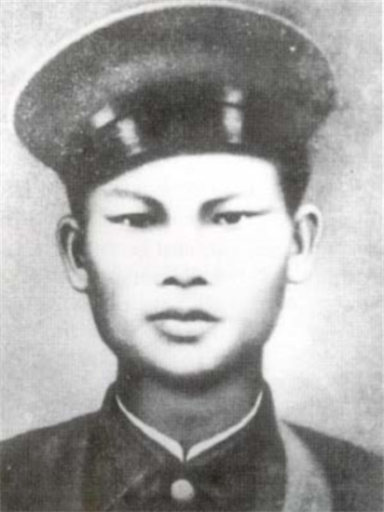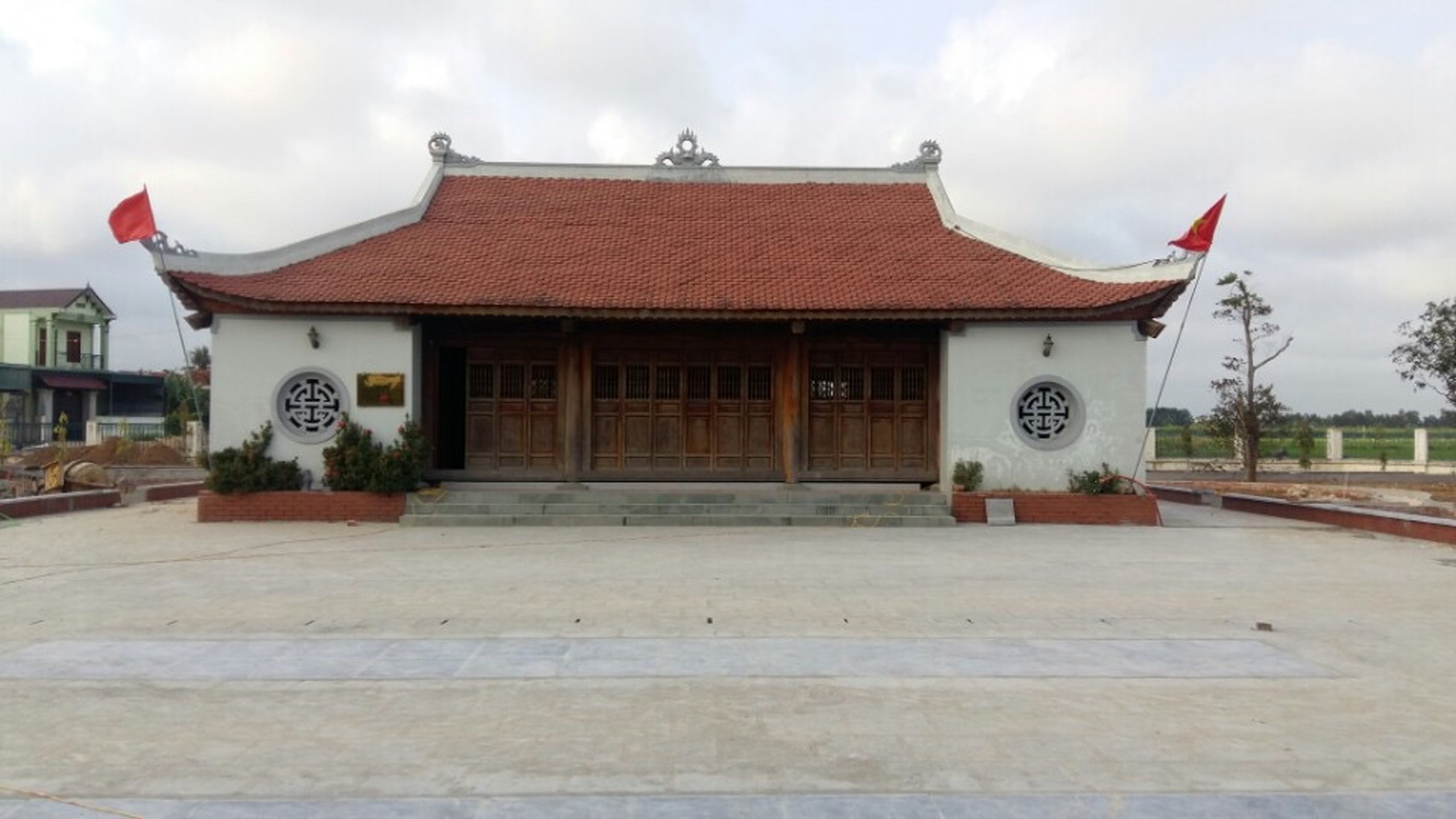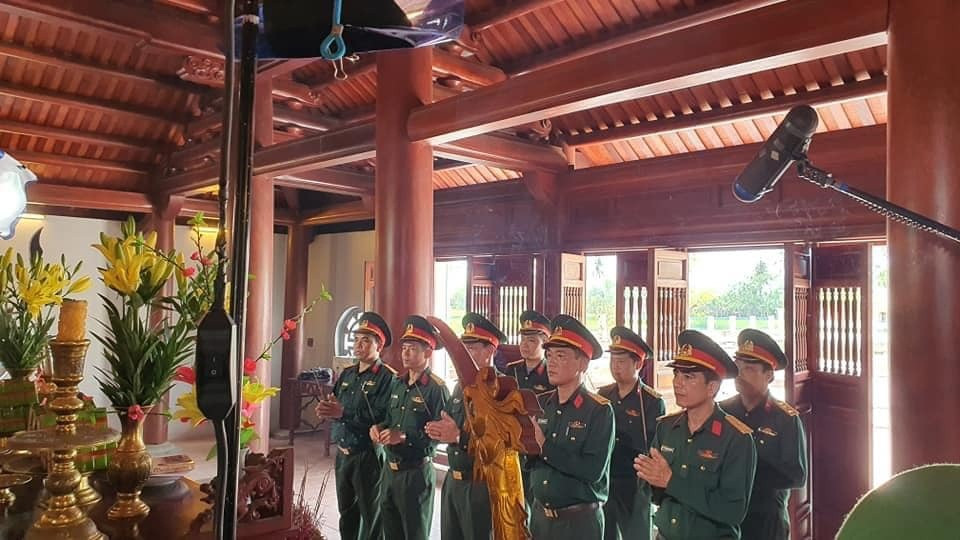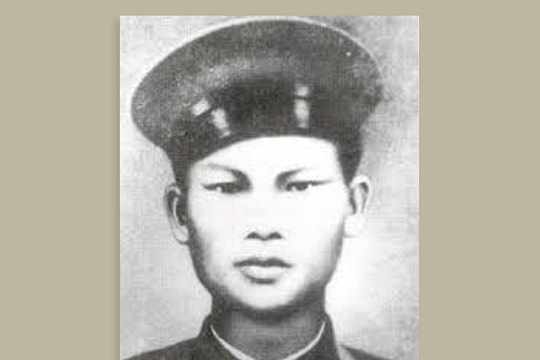Phung Chi Kien - a true revolutionary soldier and a military strategist
(Baonghean.vn) - Closing his life at the age of 40, after 16 years of revolutionary activities (from 1925 - 1941) with many different aliases and names, comrade Phung Chi Kien set a shining example of a true revolutionary soldier and a perfect military man.
During his lifetime, General Vo Nguyen Giap, when mentioning comrade Phung Chi Kien, once affirmed, “Phung Chi Kien was a staunch communist, a talented general of our army. He followed the Party and Uncle Ho all his life to participate in the revolution and resistance. Phung Chi Kien was a Party member who was extremely loyal to the revolutionary cause of the Party and the nation. He was a person who was trained and matured from a soldier to become a talented general of our army.”
From patriot to communist

Comrade Phung Chi Kien. Photo: Document
These days,Phung Chi Kien Revolutionary Martyr Relic SiteIn Dien Yen commune, Dien Chau district, it is bustling with visitors from all over coming to pay their respects and pay their respects.
Born into a farming family, but from a young age Phung Chi Kien (birth name Nguyen Vi) showed his intelligence and eagerness to learn, so his family allowed him to study Chinese characters and the national language until elementary school. Later, due to difficult family circumstances, at the age of 14, Phung Chi Kien left his hometown to work as a worker at the Truong Thi train factory, then worked for a Chinese merchant at Yen Ly station, a small station on the trans-Vietnam railway. Here, Phung Chi Kien met and interacted with patriots with similar aspirations such as Nguyen Huu Lap, Nguyen Nang Tuu... These intellectual youths guided and enlightened Phung Chi Kien to join a reading group and raise donations to support those who went abroad to find a way to save the country.
It was also during these years, through each page of books and newspapers, that Phung Chi Kien saw and understood the suffering of our people under the domination of French colonialism and always wondered how to save the country and save the people from misery. That patriotism and anxiety urged the patriotic young man Phung Chi Kien to enter revolutionary activities with all the enthusiasm of youth. That was the time in October 1926, Phung Chi Kien secretly left his homeland with a number of patriotic young men to Guangzhou (China), contacted fellow countrymen such as Le Huy Doan (aka Le Hong Phong), Pham Thanh Tich (aka Hong Thai) and participated in a political training class organized by leader Nguyen Ai Quoc and was admitted to the Vietnam Revolutionary Youth Association. This was an important turning point, the adventurous journey of the patriotic young man Phung Chi Kien that officially made him a propagandist, agitator, and organizer for the new, progressive political trend in Vietnam - the proletarian trend and made him one of the excellent students of leader Nguyen Ai Quoc.
The staunch revolutionary
Enthusiasm for the revolution along withintelligence and military thinkingSo Phung Chi Kien was chosen by leader Nguyen Ai Quoc and the Soviet military advisors to study at the Whampoa Military School under the name Manh Van Lieu. In 1927, the Whampoa Military School was closed due to Chiang Kai-shek's betrayal. He and his students participated in the Guangzhou Uprising led by the Chinese Communist Party. The uprising failed, but during this period, in his assigned position as Battalion Commander, he upheld the spirit of overcoming difficulties and hardships, steadfastly commanding the unit to fight bravely, breaking many attacks of Chiang's army, and protecting the Soviet zone.
In December 1930, Phung Chi Kien joined the Indochinese Communist Party, and was then introduced by Nguyen Ai Quoc and a number of others to Moscow to study at the Communist International's Oriental University in Moscow. However, on the way, he was arrested and imprisoned. Although he was brutally treated and tortured in prison, he still maintained his communist integrity.
In April 1932, after being released from prison, he found his way back to Moscow to study under the pseudonym Kan, with student number 5690. After a short time of completing his studies with excellence, in March 1934, he returned to the East, where many difficult and dangerous tasks were awaiting his dedication. At the First National Congress of the Party held in Macau (March 1935), he was elected to the Party Central Committee, appointed as a Standing Committee member, in charge of the Party's Overseas Department abroad and the Party's cadre training work.
 |
| Memorial site of comrade Phung Chi Kien in Dien Yen commune, Dien Chau district. Photo: Ho Ha |
In August 1936, he was sent to Saigon with Ha Huy Tap to directly lead the revolutionary movement in the country. However, a year later, at the request of Nguyen Ai Quoc, Phung Chi Kien returned to China to continue to participate in directing the Party's work abroad. In early 1940, the Overseas Command Branch was established, Phung Chi Kien was one of the first party members of this branch. In early 1941, Phung Chi Kien and a number of other comrades accompanied leader Nguyen Ai Quoc to Pac Bo, Cao Bang to participate in training and educating the first Viet Minh cadres in the country. During his time in Cao Bang, he participated in many propaganda, training, and mass mobilization activities, organized many political training courses for local cadres, and contributed to the development of Viet Minh organizations in Cao Bang. He also participated in researching and drafting principles on building armed organizations, and organized many military training courses for localities in Cao Bang.
After only three months, the Viet Minh movement had developed widely with more than 2,000 members. The experience and results of the pilot construction of the Viet Minh in Cao Bang were the practical basis for our Party to complete the strategic and tactical change of the revolution, and to outline the guidelines and methods for seizing power. The successes in restoring the organization, developing and perfecting the Party's strategic and tactical guidelines as well as building the Vietnamese revolutionary armed forces had the dedication and significant contributions of comrade Phung Chi Kien. At the 8th Party Central Committee Conference (May 1941), he was elected to the Central Executive Committee, in charge of the Party's military work, Commander-in-Chief of the Bac Son - Vo Nhai Base Area, Commander of the 1st National Salvation Army Platoon - one of the predecessor armies of the Vietnam People's Army. Under the command of Phung Chi Kien, the 1st National Salvation Army steadfastly held its ground among the people, rapidly developed, and became a reliable support for the revolutionary movement.
Fearing the development of the revolutionary movement, in mid-July 1941, the French colonialists mobilized 4,000 troops of all colors, along with local reactionary tyrants, to organize three attack prongs, implementing the vicious policy of "draining water to catch fish". Due to the imbalance of forces, to preserve the force, the National Salvation Army Command decided to divide into two wings to withdraw from Bac Son base to Cao Bang. Phung Chi Kien and Luong Van Tri commanded one wing to withdraw from Khuoi Noi to Na Ri (Bac Kan), then found a way to withdraw to Cao Bang. On August 19, 1941, when his army reached Po Kep, they were ambushed by the enemy. Phung Chi Kien commanded the brave fight, fought back tenaciously, destroyed a number of enemy forces, opened a "blood path" and found every way to escape the siege. However, all roads were blocked by the enemy. The siege gradually closed. On August 21, 1941, when his troops reached Khau Pan village, Duc Van commune (Ngan Son), they were ambushed by the enemy and suffered heavy losses. Comrade Luong Van Tri was wounded and captured by the enemy. Although seriously wounded, comrade Phung Chi Kien still held his gun tightly to block the enemy so that his comrades could escape the encirclement. When he had fired the last bullet, he fell into the enemy's hands.
 |
| Offering incense at the memorial site of comrade Phung Chi Kien. Photo: Ho Ha |
On August 22, 1941, the enemy beheaded him and hung his head on Ngan Son bridge to intimidate the local cadres and people. Phung Chi Kien fell at the age of 40, an age when he was full of energy and creative talent to contribute to the revolution. He entered eternity calmly and calmly with the words "We are patriots fighting the French, chasing away the Japanese to liberate our people. We are Vietnamese, we must unite to fight the common enemy". His heroic sacrifice is a shining example for generations of Vietnamese people.
Regretful and sorrowful, the eulogy "Mirror of sacrifice, regretful memory of comrade Phung" by General Secretary Truong Chinh published in Liberation Flag Newspaper No. 2 on August 26, 1943 once again helps us understand more about comrade Phung Chi Kien.“Thus, a talented and brilliant soldier has given his life in the midst of thousands of miles of grass… a sorrow for his comrades. Mr. Phung has passed away. But his spirit still lives on with the mountains, rivers, trees and grass…”.In recognition of his contributions, on September 23, 1947, at the Viet Bac base, President Ho Chi Minh signed Decree No. 89/SL posthumously conferring the rank of General, the first in the history of the Vietnam People's Army...


